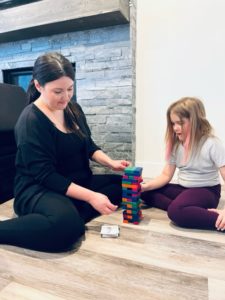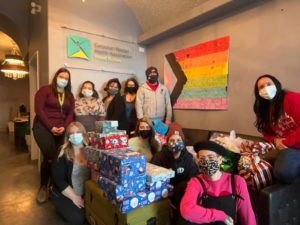The value of social work has always been essential. Now, social workers are in critical demand.
This fitting theme was adopted by the Alberta College of Social Workers for Social Work Week, March 6 to 12.

— Photo supplied by Andrea Noseworthy
In part due to weather- and health-related regional challenges, Wood Buffalo’s Amanda Holloway and Andrea Noseworthy are now seeing higher demand for the services they provide as registered social workers than ever before.
Both specialize in mental health, but their roles—much like the social work profession as a whole—offer a myriad of possibilities.
“There’s so much opportunity. There are so many places where we can work,” said Holloway, who kicked off her career after completing her Bachelor of Social Work at Memorial University in St. John’s in 2007.
“This profession has allowed me to work in social profits [a non-profit that generates revenue to cover costs with its programming], in health care, in government, in judicial spaces,” added Holloway, who leads the Canadian Mental Health Association-Wood Buffalo Branch as executive director.
“I’ve had the opportunity to work with youth and kids and adults. I just have so much opportunity.”
“If I wanted to explore another avenue tomorrow, my social work degree would allow that, because social workers can work anywhere.”
— Amanda Holloway, a registered social worker and executive director for the Canadian Mental Health Association-Wood Buffalo Branch
Noseworthy works with the Wood Buffalo Primary Care Network (PCN) and spends her time counselling patients one on one.
At the PCN, health professionals can delve into a variety of factors that may impact patients’ overall wellness.
“So, you come in for your diabetes appointment, and you get your eyes examined. Then you talk to the dietitian, and then you talk to me as well. It’s just another part of your health,” said Noseworthy. She typically gets involved with patients who are experiencing mental health issues early on.
“It’s catching those mental health pieces before they get too far advanced, and reaching people when they can make little changes that will make a big impact for them.”
At the CMHA, Holloway works hard behind the scenes to create community programs that create awareness of mental health and promote mental health prevention.
“We have a wide array of programs and services for individuals who are experiencing mental health challenges or concerns,” she explained.
“We, here in this community, are very big on prevention and promotion … We’re here for people to maintain or to gain positive mental wellness before their potential challenges.”

— Photo supplied by Amanda Holloway
Holloway is awed by the wide reach of social work. While in university, she fully expected to open her own counselling practice after graduation.
However, her career trajectory headed on a new path after spending a summer working with the homeless population at the Centre of Hope in Fort McMurray.
“I fell head over heels in love with … working right on the frontline with marginalized and vulnerable individuals,” said Holloway. “It completely changed the direction of my career. I haven’t thought about being a therapist since that summer.
“If I wanted to explore another avenue tomorrow, my social work degree would allow that, because social workers can work anywhere.”
Noseworthy also appreciates the ability to try out new roles and ideas in social work.
“You can see what areas you are weaker in and then look to build and grow in those areas.”
— Andrea Noseworthy, a registered social worker, who recently enrolled in professional development courses with support from RhPAP
She recently enrolled in courses on therapeutic play and grief recovery. Both courses received support through RhPAP’s Rural Education and Advanced Learning (REAL) Program, which is designed to help offset the costs rural health professionals may incur as they pursue professional development and education opportunities.
“You can see what areas you are weaker in and then look to build and grow in those areas,” explained Noseworthy.
She also operates a part-time practice and hopes to use her play therapy learnings in her sessions with children.
“[Play] actually opens a lot of doors when working with kids,” she said. “The way that they learn and the way that they process things is through play.
“It’s an avenue where you can meet them where they’re interested and [you can] engage them [more] easily.”
Noseworthy and Holloway agree it’s important for social workers to be agile so they can adapt as client’s needs change.
“That’s what [being a registered social worker] is all about. Showing up every day, putting on that hat to help impact positive change for individuals, groups, family and communities,” said Holloway.
“It’s meeting people where they are at, helping them develop their own skills and resiliency…. That is the heartbeat of what we do.”
